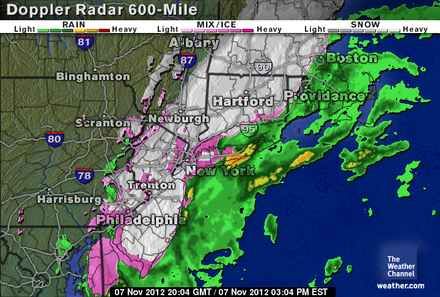Besides deciding who would occupy the Oval Office for the next four years and which party would rule in the House and Senate, there were numerous ballot measures and amendments to state constitutions that voters decided. Amy Goodman, host of Democracy Now! discuss the winners and losers of the ballot measures with her guests Justine Sarver, executive director of the Ballot Initiative Strategy Center; Benjamin Jealous, president and CEO of the NAACP; and Laura Flanders, host of GritTV and author of many books, including Bushwomen: How They Won the White House for Their Man.
The transcript can be read here.
Advocates of marriage equality ended Tuesday with four out of four victories, as voters legalized same-sex marriage in Maine and Maryland, upheld same-sex marriage in Washington state, and defeated a measure to ban same-sex marriage in Minnesota.
Maryland voters also affirmed the DREAM Act, allowing undocumented immigrants to receive in-state tuition.
In Montana, voters overwhelmingly approved a measure that would limit corporate spending on elections, while Colorado voters also resoundingly approved a measure backing a constitutional amendment that would call for the same.
In a historic move, voters in Colorado and Washington have legalized marijuana for recreational use, becoming the first states to do so.
In California, voters defeated a ballot measure to repeal the death penalty and another that would have required labeling of genetically modified foods.
A separate measure to ease penalties for nonviolent offenses under California’s “three-strikes” law was approved.
California voters also rejected a measure that would have curbed the political influence of unions.
There were a few other measures that got an “up or down” vote:
Abortion
Florida’s Amendment 6, which would have banned state resources from funding abortions, was defeated by a 10 percent margin.
Montana also wrestled with abortion issues with LR-120, also known as the Montana Parental Notification Measure, which passed with 70 percent of the vote. LR-120 requires doctors to notify parents of minors under the age of 16 at least 48 hours before performing an abortion.
Church vs. State
Florida voters rejected Amendment 8, which would have overturned the so-called Blaine Amendment, which prohibits religious organizations from receiving direct state funding. The measure failed 56 to 44 percent.
“This proposed amendment would have done nothing to preserve religious liberty,” said Daniel Mach, director of the ACLU Program on Freedom of Religion and Belief, claiming that it would have instead “stripped away key safeguards.”
Assisted Suicide
Massachusetts’ Question 2, better known as the “Death with Dignity Act,” official was too close to call, but supporters nonetheless conceded defeat. The act would have legalized physician-assisted suicide for terminally ill patients expected to die within six months. The measure was strongly opposed by the state’s Catholic bishops.
Marijuana
Six states voted on measures concerning marijuana. Colorado, Massachusetts, Montana and Washington passed measures liberalizing marijuana use. Measures in Arkansas and Oregon failed.
The measures in Arkansas, Massachusetts and Montana dealt with medical marijuana, while the measures in Colorado, Oregon and Washington sought to legalize state-regulated recreational marijuana. Recreational pot use in Colorado and Washington state will now be legal once the measure is fully implemented, although many observers expect a conflict with federal drug laws.
Gambling
Maryland approved Question 7, which greatly expanded casino gambling within the state, particularly in suburban Washington. Rhode Island voters approved two new casinos, and Oregon rejected private casinos.


 With thousands still without electricity or even homes, the
With thousands still without electricity or even homes, the
Recent Comments